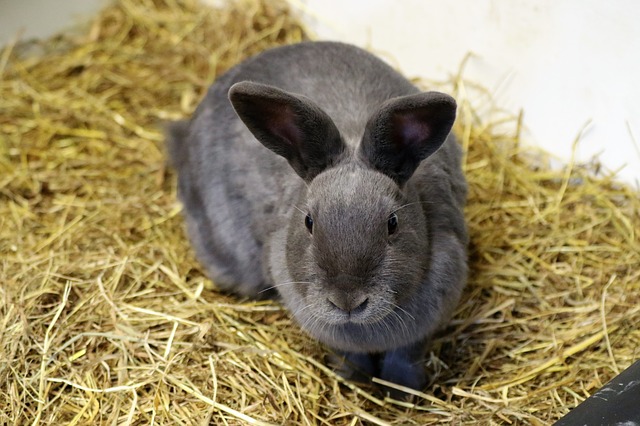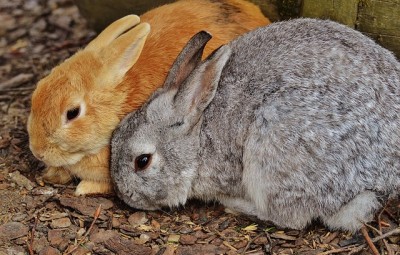If you’re considering meat rabbits for your family, look no further. Here you’ll find the basics of raising rabbits as a cost-effective, efficient and humane source of meat.
Housing Requirements
There are several schools of thought related to how to house rabbits. Some owners use wire cages, while others go for a more natural “colony” approach, which keeps all of the rabbits together in one pen on the ground, allowing them to form family groups and use their natural burrowing instincts.
You also can use rabbit tractors, an open bottom cage placed directly on the grass and moved periodically to give fresh grass to the rabbits. This is a great temporary or short-term option.
You can see the American Rabbit Breeder Association minimum space requirements here. [2]
Diatomaceous Earth: The All-Natural Livestock De-Wormer [3]
Although those are the minimum requirements, we recommend a cage 30 inches by 36 inches and 18 inches tall for a breeding doe (female rabbit). This way, she has plenty of room for her nest box and her babies as they begin to grow but are not yet weaned. A buck (male rabbit) can be caged according to the size of the rabbit.
Grow-out cages, where the young rabbits will grow until processing day, should have more space to accommodate the larger number of rabbits. Young rabbits also will do well in rabbit tractors after they’ve reached a certain size.
When building cages for rabbits, you need to use wire with a minimum of 1-inch by 1-inch squares. It’s even better if it’s 1 inch by half an inch. Make sure the holes aren’t too wide, so as to protect rabbit feet and keep babies from being able to squeeze out. Never use chicken wire! It’s as easy for rabbits to chew through as grass, and will not adequately protect them from predators, either.
What Breed Is Right For You
Of course, you need to know which breed of meat rabbit fits your circumstances. There are several different breeds of rabbit that are good for meat purposes, but here are a few of the most popular ones:
- New Zealand. New Zealand rabbits grow to be approximately 8-10 pounds and come in red, white, black and broken fur. They are stocky, midsize rabbits that have a decent growing rate and a good meat-to-bone ratio.
- Californian. Californian rabbits are white with black points, and pink or red eyes. As adults, they reach around 8-11 pounds. Californians have a blocky, thick physique that is ideal for meat.
- Silver Fox. The Silver Fox is a great homestead rabbit with a sweet temperament and beautiful fur that is black with white/silver tips. When processed, it produces about 65 percent of its live weight in meat.
Breeding And Gestation
Rabbit breeding is fairly simple, not to mention hilariously fast. One rule of thumb with the breeding process is to never bring the buck to the doe’s cage. Female rabbits are notoriously territorial toward males and do not take kindly to them encroaching on their space. Instead, bring the doe to the buck’s cage, and remove the doe immediately after mating to prevent fights.
“The Big Book Of Off The Grid Secrets” — Every Homesteader Needs A Copy! [4]
The rabbit gestation period is between 28 and 32 days, but most rabbit owners will tell you they typically give birth on day 31. Mother rabbits need a nest box (you can buy or build one) and should keep the babies with them until they are around 4 to 6 weeks in age, at which point they can be moved to their own cage with more growing room. Rabbits can have anywhere between 4-14 babies (or “kits”) per litter, but the average is 6-8.
What To Feed Them
- Alfalfa pellets. This is, by far, the simplest way to feed rabbits. Alfalfa pellets are available at any local farm supply store. They are the simplest way to make sure your rabbits are getting the proper nutrition (just make sure the protein percentage is at least 16 percent).
- Tractors/Cut and Carry. One of the most natural ways to feed your rabbits is to put them directly on the grass in a “rabbit tractor,” but in smaller yards, this may not be possible. Supplementing or even replacing alfalfa pellets with cuttings from mowing the lawn, garden weeding and other yard chores (provided you check to make sure they aren’t poisonous to rabbits) is a great option for those in an urban or suburban setting.
- Fodder. If yard clippings are helping to offset the use of pellets, but aren’t enough to completely replace them, you may consider growing fodder. Under a grow light, you can grow various kinds of grasses in shallow boxes. Done with the proper research and organization, many rabbit owners have found they can forego pellets without making any nutritional sacrifices.
How To Process Them
Processing a rabbit is far easier than processing a chicken, America’s preferred choice for white meat. Before you get into rabbits, do some research on the butchering process. Ideally, find a local meat rabbit breeder and get some hands-on experience with the process to make sure it’s something you can do before you get into raising them yourself.
If you find you can’t participate in the butchering process, you always can outsource that part to someone else, although it isn’t the most cost-effective option.
Do Some Research
There’s a lot to learn before you run out and get your rabbitry started, but hopefully this list gives you the foundation you need to get started. Check out a book or two, find an online community, and ask questions. Raising rabbits for meat is a simple, low-cost and humane way to feed your family.
Have you ever raised rabbits? What advice would you add? Share your tips in the section below:
Harness The Power Of Nature’s Most Remarkable Healer: Vinegar [6]

